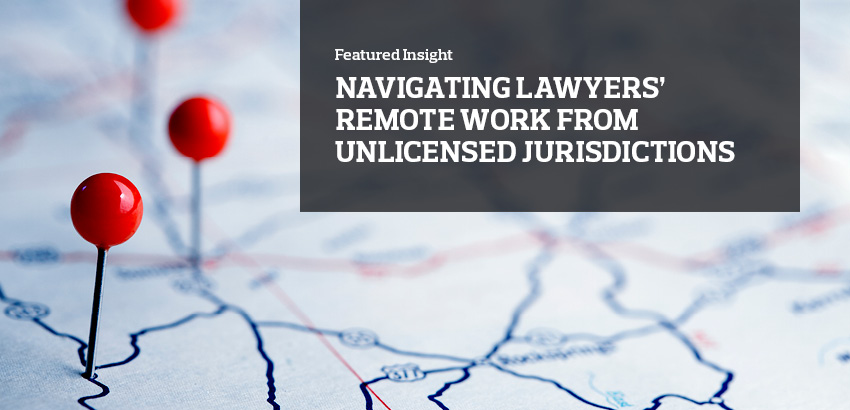Aon | Professional Services Practice
Navigating lawyers’ remote work from unlicensed jurisdictions
Release Date: February 2021 Lawyers working remotely from a jurisdiction where they are not licensed to practice likely do not need to be concerned about the unauthorized practice of law (“UPL”) if they are temporarily practicing there due to the pandemic. But temporary remote work locations may ultimately become permanent or at least regular, making lawyers’ physical presence in an unlicensed jurisdiction subject to UPL scrutiny.
In its latest bulletin to clients, ABA Ethics Opinion Clarifies Remote Work from Unlicensed Jurisdictions, Loss Prevention Bulletin 21-01 (January 2021), Aon’s loss prevention team discusses a recent opinion by the American Bar Association Standing Committee on Ethics and Professional Responsibility that generates significant momentum for lawyers working remotely from an unlicensed jurisdiction—at least under specific conditions. The following are some of the highlights from the loss prevention team’s bulletin.
ABA Formal Opinion 495 states at the outset that the jurisdiction where a lawyer is working remotely cannot have a statute, rule, court decision, or ethics opinion providing that such conduct constitutes UPL. In the absence of this determination, there are two primary restrictions on a lawyer’s remote work activities.
First, a lawyer may only practice the law of the jurisdictions in which she is licensed. This includes not only the law of a lawyer’s licensed jurisdiction, but also encompasses temporary practice involving other states’ or federal laws. In short, ABA Formal Opinion 495 permits a lawyer to practice from a remote work location the same law(s) the lawyer is authorized to practice from an office in her licensed jurisdiction.
Second, a lawyer cannot publicize her availability to perform legal services in the remote work jurisdiction, nor otherwise imply that she is licensed there or that she has an office in that location. It is therefore advisable for a lawyer to indicate on her public profiles only the jurisdiction where she is licensed to practice law and the office address in her admitted jurisdiction. A lawyer should not list her remote work address on her firm’s website, letterhead, a business card, or advertising. In effect, a lawyer must remain invisible as a lawyer to the jurisdiction where she is working remotely.
Stepping back from ABA Formal Opinion 495’s general framework, a lawyer working remotely from an unlicensed jurisdiction should keep in mind three more points:
Model Rule 5.5’s safe harbors. The non-admitted jurisdiction’s temporary practice safe harbors may protect a lawyer’s limited or occasional remote work. ABA Model Rule of Professional Conduct 5.5, which is the template for cross-border practice in most jurisdictions, provides four temporary practice safe harbors: (1) association with local counsel; (2) legal services related to pending or potential litigation; (3) legal services related to an arbitration, mediation, or other alternative dispute resolution matter; and (4) legal services reasonably related to a lawyer’s admitted state practice.
Services authorized by law. Lawyers may work remotely from a non-admitted jurisdiction—whether on a temporary or permanent basis—if their legal services are authorized by law. This could include a lawyer’s federal law practice and appearances before federal courts, agencies, and specialized tribunals. State law or rules can also provide shelter. Arizona, Minnesota, New Hampshire, North Carolina, and Virginia expressly authorize a non-admitted lawyer to establish a practice that is limited to the law of the lawyer’s licensed jurisdiction.
Client and matter location counts. There is no hard and fast rule obligating a lawyer working remotely from an unadmitted jurisdiction to represent only clients located in the lawyer’s licensed jurisdiction—although that is clearly a safe approach. But, unless a temporary safe harbor applies from the non-admitted jurisdiction, or the lawyer’s services are authorized by law, a lawyer should restrict her remote work activities to clients with matters arising from the lawyer’s licensed jurisdiction.
The expectation is that flexible work arrangements will continue long after the pandemic ends. Given that most states have not issued guidance on lawyers’ remote work practices from unlicensed jurisdictions, ABA Formal Opinion 495’s common sense limitations should lead the conversation. ABA ethics opinions are not binding on any jurisdiction, but courts and state ethics authorities routinely cite them in interpreting their own versions of the rules of professional conduct. Undoubtedly, there will be some states that take a contrary view. Thus, if a lawyer anticipates working remotely on a regular basis from a non-admitted jurisdiction, the prudent course is still to apply for admission to the new jurisdiction. Moreover, lawyers in that situation should not delay in applying for admission to practice in the new jurisdiction. The longer lawyers wait to apply for admission, the more likely they are to trigger UPL scrutiny.
“While ABA Formal Opinion 495’s common sense approach to remote work in unlicensed jurisdictions should lead the conversation, some states may take a contrary view. If a lawyer anticipates working remotely on a regular basis from a non-admitted jurisdiction for the foreseeable future, the prudent course is still to apply for admission to the new jurisdiction.”
Matt Corbin, Senior Vice President, Loss Prevention, Aon
Contact
For more information about this topic and the value-added loss prevention services Aon provides to its legal professional liability insurance brokerage clients, please contact Matthew Corbin.
Matthew Corbin
Managing Director
Kansas City

